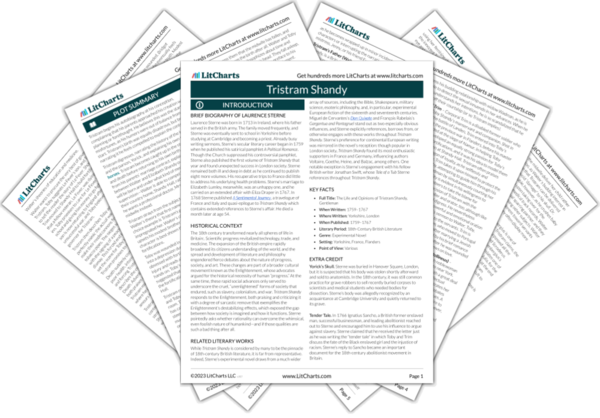The concept of the straight line symbolizes Tristram’s view that life (and the stories one writes to describe it) is nonlinear and often illogical. Tristram, who stubbornly and perpetually digresses as he attempts to tell the story of his life, holds up the straight line as an unattainable ideal for storytelling, and he constantly promises the reader that his winding narrative is slowly being perfected into a smooth straight line. The aspirational nature of this symbol is of course very much ironic. Tristram first references the straight line when turning to his mother’s marriage contract to explain the circumstances of his birth. The complicated legal reasons Tristram was born at Shandy-Hall, retold in the original complicated legalese, make it very clear that readers won’t find anything even approximating straightforward progression in this story.
It’s not only the story’s narration that lacks a straightforward progression: Toby, in his studies of fortifications, becomes obsessed with the physics of cannonballs, attempting to deduce why they do not travel in straight lines after firing. In his narration, Tristram mockingly begs his uncle not to pursue such arcane knowledge, warning him there is no end to such a quest. Eventually Tristram feels compelled not only to reference the straight line but also to draw it, mapping out his digressions with “scientific” diagrams. This too is a trick, however—the straightforward narrative that the drawings promise never arrives, even in the final volume’s recounting of Toby’s amours. In teasing the reader with this promised vision of a straight line, Tristram casts doubts on whether telling a story in such a straightforward, rational manner is even possible, let alone desirable.
A Straight Line Quotes in Tristram Shandy
This right line,—the path-way for Christians to walk in! say the divines—
—The emblem of moral rectitude! says Cicero—
—The best line! say cabbage-planters—is the shortest line, says Archimedes, which can be drawn from one given point to another.—
I wish your ladyships would lay this matter to heart in your next birth-day suits!
—What a journey!
Pray can you tell me,—that is, without anger, before I write my chapter upon straight lines—by what mistake—who told them so—or how it has come to pass, that your men of wit and genius have all along confounded this line, with the line of Gravitation.










